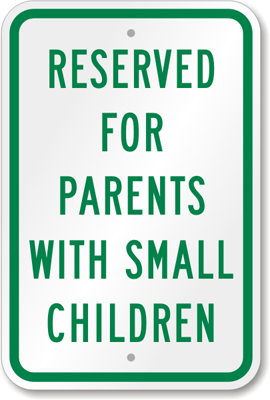 Little by little, with every passing year, parking lots are getting divvied up into more and more reserved parking spots. Each step on this path seems justified and sensible. Who would deny handicapped spaces? No one with any sense about them. And once we have them, it seems a small step to have spaces reserved for people with small children. Then let's reserve some for employees, and amongst those, reserve the best for the higher-ranked employees, and for the "employee of the month." And while we're at it, how about rewarding the use of energy-efficient vehicles with some reserved spaces? And spaces set aside for veterans, because of course we want to thank them for their service, and isn't one parking space the least we can do?
Little by little, with every passing year, parking lots are getting divvied up into more and more reserved parking spots. Each step on this path seems justified and sensible. Who would deny handicapped spaces? No one with any sense about them. And once we have them, it seems a small step to have spaces reserved for people with small children. Then let's reserve some for employees, and amongst those, reserve the best for the higher-ranked employees, and for the "employee of the month." And while we're at it, how about rewarding the use of energy-efficient vehicles with some reserved spaces? And spaces set aside for veterans, because of course we want to thank them for their service, and isn't one parking space the least we can do?Not one of these seems unjustified or a bad idea. But in some parking lots, it's already the case that a quarter or more of the spaces are reserved. And you only have to wander around seeing lots of good spaces sitting unused for hours at a time while worse spaces are filled up (or worse yet, all the non-reserved spaces are filled up) before you see the problem. All this fragmentation reduces the versatility of the available space.
What would be ideal, of course, is if everyone got to park anywhere that was available, but anyone with a superior claim could somehow "bump" people out of the "reserved" spaces when they arrived. That way, if there were no veterans or handicapped people there, everyone else would get to use the parking available in an optimal way, and when there were veterans or handicapped people, they would still get the first claim on good spaces that they should have. You can almost (but not quite) treat bus seats this way: the seats up front are available for anyone, but if someone with a better claim comes along, they can kick people out.
But cars are not bumpable.
So whenever we are deciding whether to reserve another space or two for this or that worthy cause, we have to consider the budgeting fallacy: you can't go solely on whether it seems justified in isolation, but also, how it fits into the overall budget of your parking lot's space and how it needs to be used.

 RealTime and RTC
RealTime and RTC Prism
Prism Uncreated
Uncreated Bloodweavers
Bloodweavers Foulspawner's Legacy
Foulspawner's Legacy Lusternia
Lusternia
2 comments:
Why would parents with small children get a reserved space? And who decideds if children are small enough. The same goes for all the other "categories", it's something I deeply oppose, I don't like to categorize people and I don't like to be put in a category, it's called discrimination. I have one category, and one alone, it's the Human race, and I think we all fit in there perfectly.
The handicapped spots serve a completely different function, usually they are close to the entrance/exit so the handicapped person has less distance to travel which is many times harder for them.
My preference is keep the handicapped spots, all other spots, free of use by the human race
Cars are not bumpable? What about bumper cars?
OK, silly joke. There is a solution using something that already exists. I've seen this in big cities - New York, Tokyo, etc - where cars are stacked in a sort of vertical carousel to make the most of a limited area.The empty spots would always be on the bottom, easy to access, and once a car goes in, it gets moved up and a new spot replaces it. Everyone always has preferential treatment. Of course, these would have to be small, so that 3 people are not wanting their car at the same time, or a system that can shuffle cars about so that as many people as there are ground entrances to the system can get to their cars at the same time.
Hmmf. You know what, bag all of it and install Star Trek style transporters. Situation solved. Beam back your groceries, your purchases; beam to that restaurant, beam back home - who needs parking? OK, for the few Dr. McCoy types.
Post a Comment